- Home
- Medical news & Guidelines
- Anesthesiology
- Cardiology and CTVS
- Critical Care
- Dentistry
- Dermatology
- Diabetes and Endocrinology
- ENT
- Gastroenterology
- Medicine
- Nephrology
- Neurology
- Obstretics-Gynaecology
- Oncology
- Ophthalmology
- Orthopaedics
- Pediatrics-Neonatology
- Psychiatry
- Pulmonology
- Radiology
- Surgery
- Urology
- Laboratory Medicine
- Diet
- Nursing
- Paramedical
- Physiotherapy
- Health news
- Fact Check
- Bone Health Fact Check
- Brain Health Fact Check
- Cancer Related Fact Check
- Child Care Fact Check
- Dental and oral health fact check
- Diabetes and metabolic health fact check
- Diet and Nutrition Fact Check
- Eye and ENT Care Fact Check
- Fitness fact check
- Gut health fact check
- Heart health fact check
- Kidney health fact check
- Medical education fact check
- Men's health fact check
- Respiratory fact check
- Skin and hair care fact check
- Vaccine and Immunization fact check
- Women's health fact check
- AYUSH
- State News
- Andaman and Nicobar Islands
- Andhra Pradesh
- Arunachal Pradesh
- Assam
- Bihar
- Chandigarh
- Chattisgarh
- Dadra and Nagar Haveli
- Daman and Diu
- Delhi
- Goa
- Gujarat
- Haryana
- Himachal Pradesh
- Jammu & Kashmir
- Jharkhand
- Karnataka
- Kerala
- Ladakh
- Lakshadweep
- Madhya Pradesh
- Maharashtra
- Manipur
- Meghalaya
- Mizoram
- Nagaland
- Odisha
- Puducherry
- Punjab
- Rajasthan
- Sikkim
- Tamil Nadu
- Telangana
- Tripura
- Uttar Pradesh
- Uttrakhand
- West Bengal
- Medical Education
- Industry
Febuxostat use in gout patients may increase risk of hepatotoxicity: Study

A new study published in the journal of Arthritis Care & Research showed that in individuals with gout, usage of Febuxostat is linked to a noticeably higher risk of mild-to-moderate liver function disruption than using benzbromarone.
Despite the effectiveness and widespread availability of urate-lowering treatment (ULT), gout is still not well treated, in part due to worries about adverse medication reactions. Although it can result in a rare hypersensitivity syndrome that is more prevalent in those of Southeast Asian heritage, allopurinol is advised as the recommended first-line treatment. Allopurinol and Febuxostat are equally effective for ULT.
Metabolic dysfunction–associated steatohepatitis (MASH) affects around 25% of gout sufferers, and it may raise the risk of drug-induced liver damage. Therefore, it has been suggested that serum liver function tests (LFTs) be monitored during ULT. This study assessed the hepatotoxicity risk of benzbromarone and febuxostat usage in gout patients.
An electronic medical record database was used to identify new users of benzbromarone or febuxostat who had their liver function monitored at least three times within a year after starting the study medications. The two groups were matched 1:1 for age, sex, and pretreatment levels of aspartate aminotransferase (AST) and alanine aminotransferase (ALT) in order to perform propensity score matching (PSM). The chance of hepatotoxicity (defined as ALT or AST > 3× upper limit of normal) was estimated using Kaplan-Meier analysis. Based on comorbidities, body mass index, and age, subgroup analysis was carried out.
A total of 2,338 gout patients in all were qualified. For AST or ALT abnormalities, 37% of patients had Common Terminology Criteria for Adverse Events version 5 grades 1–3. Following PSM, 488 users of febuxostat were paired, and 488 of them received benzbromarone throughout a mean follow-up of 1.20 years. For users of benzbromarone and febuxostat, the incidence of hepatotoxicity was 16.8 and 39.6 per 1,000 person-years, respectively.
When compared to benzbromarone, the use of Febuxostat was linked to a noticeably higher risk of hepatotoxicity, particularly in individuals whose baseline transaminases were increased. The results did not vary based on the predefined subgroups. Overall, gout patients who begin taking febuxostat as opposed to benzbromarone are much more likely to experience bouts of hepatotoxicity, which are characterized as ALT or AST >3 times ULN.
Referene:
Sun, W., Cui, L., Terkeltaub, R., Chen, Y., Li, X., Cheng, X., Liu, T., Dalbeth, N., & Li, C. (2025). Risk of hepatotoxicity in patients with gout treated with febuxostat or benzbromarone: A propensity score-matched cohort study. Arthritis Care & Research. https://doi.org/10.1002/acr.25547
Neuroscience Masters graduate
Jacinthlyn Sylvia, a Neuroscience Master's graduate from Chennai has worked extensively in deciphering the neurobiology of cognition and motor control in aging. She also has spread-out exposure to Neurosurgery from her Bachelor’s. She is currently involved in active Neuro-Oncology research. She is an upcoming neuroscientist with a fiery passion for writing. Her news cover at Medical Dialogues feature recent discoveries and updates from the healthcare and biomedical research fields. She can be reached at editorial@medicaldialogues.in
Dr Kamal Kant Kohli-MBBS, DTCD- a chest specialist with more than 30 years of practice and a flair for writing clinical articles, Dr Kamal Kant Kohli joined Medical Dialogues as a Chief Editor of Medical News. Besides writing articles, as an editor, he proofreads and verifies all the medical content published on Medical Dialogues including those coming from journals, studies,medical conferences,guidelines etc. Email: drkohli@medicaldialogues.in. Contact no. 011-43720751


